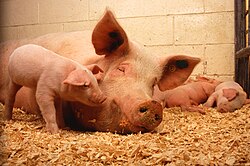
Pork is a food taboo among several religions, including Jews, Muslims, and some Christian denominations. Swine were prohibited in ancient Syria[1] and Phoenicia,[2] and the pig and its flesh represented a taboo observed, Strabo noted, at Comana in Pontus.[3] A lost poem of Hermesianax, reported centuries later by the traveller Pausanias, reported an etiological myth of Attis destroyed by a supernatural boar to account for the fact that "in consequence of these events the Galatians who inhabit Pessinous do not touch pork".[4] In Abrahamic religions, eating pig flesh is clearly forbidden by Jewish (kashrut), Islamic (halal) and Christian Adventist (kosher animals) dietary laws.
Although Christianity is an Abrahamic religion,[5] most of its adherents do not follow these aspects of Mosaic law and do consume its meat. However, Seventh-day Adventists consider pork unclean according to biblical law, along with other foods forbidden by Jewish law. The Ethiopian Orthodox Church and the Eritrean Orthodox Church[6] do not permit pork consumption. Hebrew Roots Movement adherents also do not consume pork.
The pig tended to be regarded as a dangerously liminal animal. With the feet of a cud-eater, the diet of a scavenger, the habits of a dirt-dweller and the cunning of a human, it exhibited an unsettling combination of characteristics, rendering it culturally inedible for some (but not all) southern Levantine peoples, for whom pigs were often associated with the underworld or malevolent supernatural powers.'
Stavrakopoulou, Francesca, [7]
- ^ Lucian of Samosata notes that they do indeed eat pork for followers of the Dea Syria (Atargatis, the 'Syrian goddess') in De dea Syria, noted in Jan N. Bremmer, "Attis: A Greek God in Anatolian Pessinous and Catullan Rome", Mnemosyne, Fourth Series, 57.5, (2004:534–573) p. 538.
- ^ As the pagan Porphyry of Tyre noted in De abstinentia ab esu animalium, late third century CE.
- ^ Strabo, xii.8.9.
- ^ Noted in Bremmer 2004:538 and notes. Bremmer notes that the taboo regarding pork for followers of Attis is reported in Julian, Orationes v.17.
- ^ Microsoft News. Surprising things forbidden by the Bible. Retrieved on 6 May, 2023. "Leviticus 11:7-8 states: 'The pig, though it has a split hoof completely divided, does not chew the cud; it is unclean for you. You must not eat their meat or touch their carcasses; they are unclean for you.'"
- ^ Charles Kong Soo Ethiopian Holy Week clashes with Christians' 21 April 2011 Trinidad and Tobago Guardian Retrieved 11 March 2012
- ^ Stavrakopoulou, Francesca (25 January 2022). God: An Anatomy. Knopf. p. 214. ISBN 978-0-525-52045-0.